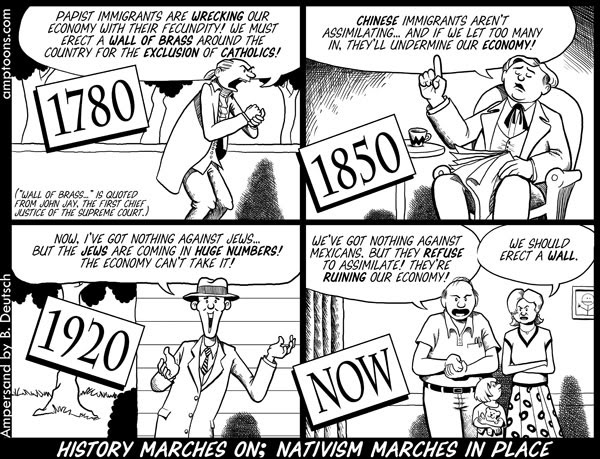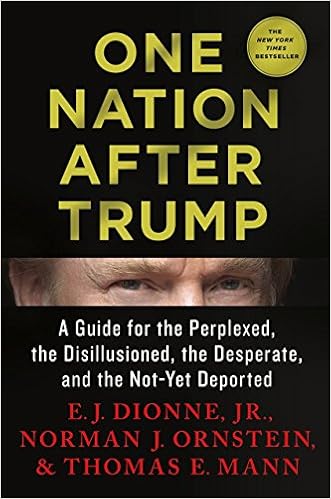
* * * *
 I called the first draft of this post, “Cultural elites and Trump.” But then I ran across – at a local library days ago – the 2017 book, One Nation After Trump: A Guide for the Perplexed, the Disillusioned, the Desperate, and the Not-yet Deported. ( :
I called the first draft of this post, “Cultural elites and Trump.” But then I ran across – at a local library days ago – the 2017 book, One Nation After Trump: A Guide for the Perplexed, the Disillusioned, the Desperate, and the Not-yet Deported. ( :
Whether by vote in 2020 or operation of law in 2024, Trump will end up leaving the White House. What happens then? Aside from the cheering, the dancing in the streets, the fireworks and parades, a new nightmare will begin – for Donald Trump.
And when it might be said – yet again – “Our long national nightmare is over.”
But first let’s go back to Some thoughts on “the Donald.” That post came in December 2018, but looked back at posts “from two years ago.” That is, two years before 2018, to a post I did in December 2016, right after Trump’s election. Among other things there was a prediction in 2016 – by Professor Allan Lichtman – that Trump would be “impeached within two years.”
Which hasn’t happened. He may yet be impeached – by a Democrat House of Representatives. But he won’t be convicted by the Republican-controlled Senate. (It would take 66 votes.) Which brings us back to the hope offered by One Nation After Trump. I just started reading it, but hear are some sample reviews. Like the one from the Amazon blurb:
Yet if Trump is both a threat to our democracy and a product of its weaknesses, the citizen activism he has inspired is the antidote. The reaction to the crisis created by Trump’s presidency can provide the foundation for an era of democratic renewal and vindicate our long experiment in self-rule.
 Or consider the conclusion of The Guardian, the British daily newspaper (now online), founded in 1821 as The Manchester Guardian. See One Nation After Trump review: “In everything from the Women’s March on Washington [at left] to the ad hoc groups of lawyers who flocked to airports across the country to help victims of Trump’s travel ban, the [authors] see strong evidence that the rational part of the country is finally ready to take back America.”
Or consider the conclusion of The Guardian, the British daily newspaper (now online), founded in 1821 as The Manchester Guardian. See One Nation After Trump review: “In everything from the Women’s March on Washington [at left] to the ad hoc groups of lawyers who flocked to airports across the country to help victims of Trump’s travel ban, the [authors] see strong evidence that the rational part of the country is finally ready to take back America.”
Then there was a New York Times review, which opined that Trump’s rise to power. . .
. . . reflects the longer-term trends that have shaped the modern Republican Party: the four-decade war on the “liberal media”; the delegitimatization of political opponents; the appeals to racism and xenophobia; the hostility to democratic norms. “Trump is less of an outsider than he seems, and he was building on rather than resisting recent trends within the G.O.P.”
And which concluded – depressingly – that “Reading this important book, one gets the nagging sense that even after Trump, Trumpism will persist.” Let’s hope not.
Which brings us back to “Cultural elites and Trump.” That is, before starting to read One Nation After Trump, I tried to figure out how Trump got elected in the first place. I initially wrote:
It finally hit me. “What’s the attraction with Trump?” The answer? Donald Trump is “America showing its ass.” (Or mooning, to put it more politely.) Put another way, Trump “represents” – and I use the term loosely – a certain segment of American society which now chooses to thumb its nose at – or more precisely “moon” – both the rest of the world and that “cultural elite” part of American society that it hates so much.
 Which got support in articles like Send Her Back! Send Her Back! – The Bulwark. It noted “acts of deliberate transgression against what many Trump supporters have come to view as the supposedly stifling ethics of our cultural elites,” and sending ”those damn media types into a tizzy.” Also that his verbal attacks – though not including the one where he “fat shamed his own supporter ” – are just another “handy weapon for triggering the pearl-clutching libs.” See also Class warfare between workers and elites explains Trump:
Which got support in articles like Send Her Back! Send Her Back! – The Bulwark. It noted “acts of deliberate transgression against what many Trump supporters have come to view as the supposedly stifling ethics of our cultural elites,” and sending ”those damn media types into a tizzy.” Also that his verbal attacks – though not including the one where he “fat shamed his own supporter ” – are just another “handy weapon for triggering the pearl-clutching libs.” See also Class warfare between workers and elites explains Trump:
What’s happening in America is an echo of what’s happening in democracies around the world, and it’s not happening because of Trump. Trump is the symptom of a ruling class that many of the ruled no longer see as serving their interest, and the anti-Trump response is mostly the angry backlash of that class as it sees its position, its perquisites and – perhaps especially – its self-importance threatened.
Which definitely presents a problem for those of us yearning for “the America of past years.” And especially of past presidents, none of whom now seem so bad. But now: Do you see the irony? Of Liberals and Independents trying to “go back in time,” while today’s “Conservatives” seem bent on tearing out all of America’s democratic institutions root and branch?
But perhaps all is not lost. One thing that One Nation pointed out – early on – was how slim the margin of victory was. Aside from losing the popular vote by 2.9 million, “Trump’s victory was a very close-run thing – a matter of 77,744 votes in three crucial states.” His win was also “enabled” by James Comey reopening a probe into Hillary’s use of a private server while secretary of state, and by Russian interference in addition to hacked emails from the Democratic National Committee. (Likely by Russian hackers.)
Yet despite all that help this “monumental shift in the nature of the nation’s political leadership was enabled by relatively modest shifts in the electorate.” And by voters rejecting Hillary.
Some good news? Such numbers “are critical for understanding how fragile Trump’s hold on the public is.” (I’ve been saying the best weapon against Trump is his own big mouth.) Then there’s “Trumpgret,” as in New Hampshire struggle: Voters feeling “Trumpgret.” So maybe there’s hope that 2020 voters will again reject this ongoing dark side of American politics…
* * * *

“American As Apple Pie?” Americans have always hated immigrants…
* * * *
The upper image is courtesy of American Anti-immigrant Propaganda – Image Results.
Re: “Root and branch.” I Googled “tear out root and branch” and got Sadly The Hatred Against Syrian Refugees Is As American As Apple Pie. From November 2015, it noted:
As the world faces one of the worst humanitarian crises yet known, several American politicians went out of their way to attack some of the world’s most vulnerable people, continually competing to be the most cruel.
A trend that continues “even to this day.” The article concluded that we must “fight the bigots who are acting so cruelly to people so desperately in need of aid.” But we shouldn’t pretend this ongoing sickness is “‘un-American.’ It is a tendency in our history that we must tear out root and branch, but before we do that, we have to realize that it’s there.” See also Root and branch definition and meaning | Collins English Dictionary: “If something has been completely changed or destroyed, you can say that it has been changed or destroyed root and branch.”
The “fat-shamed” image is courtesy of Donald Trump Fat Shamed One Of His Own Supporters. The article posted August 16, 2019, in UNILAD, the “British Internet media company and website owned by LADbible Group,” which provides “‘social news. and entertainment to their 60 million followers, and has offices in London and Manchester, UK.” The caption: “President Donald Trump accidentally fat shamed one of his own supporters at a campaign rally in Manchester, New Hampshire after mistakenly believing them [sic] to be a protester.” The article went on: “Trump proceeded to insult a man he believed to be one of the protesters, focusing on his ‘weight problem.’ However, he didn’t realise the man he was fat shaming was actually one of his very own supporters, an individual who had reportedly been flagging the protesters to security.“
The references to the “One nation” book are from pages 21-22 of the 2017 hardcover edition.
 The lower image courtesy of Anti-Irish sentiment – Wikipedia. The caption, “American political cartoon by Thomas Nast titled ‘The Usual Irish Way of Doing Things,’ depicting a drunken Irishman lighting a powder keg and swinging a bottle. Published 2 September 1871 in Harper’s Weekly.” Another image from the same article – at right – was captioned, “An Irishman depicted as a gorilla (‘Mr. G. O’Rilla’).”
The lower image courtesy of Anti-Irish sentiment – Wikipedia. The caption, “American political cartoon by Thomas Nast titled ‘The Usual Irish Way of Doing Things,’ depicting a drunken Irishman lighting a powder keg and swinging a bottle. Published 2 September 1871 in Harper’s Weekly.” Another image from the same article – at right – was captioned, “An Irishman depicted as a gorilla (‘Mr. G. O’Rilla’).”
Which supports the claim that Americans have always hated immigrants. See also got Sadly The Hatred Against Syrian Refugees Is As American As Apple Pie, which noted that this American “hatred” goes back as far as 1790:
Just look at the Naturalization Act of 1790, one of the first important pieces of immigration legislation. It limited citizenship to those who were “free white persons.” One year before the passage of the Bill of Rights, those vaunted rights were effectively being limited to white men. When waves of Irish immigrants came over in the mid-1800s, they were feared and hated, commonly depicted as ape-like by native born whites… These nativists didn’t just spread hate, they burned Catholic churches, and instigated anti-immigrant riots.
* * * *
Here are more notes from my research on “Trump’s attraction.”
See Trump’s dislike of — and desire to be a part of — the ‘elite.’
“Trump has since made a name for himself – in New York City and, more unexpectedly, in Washington. As he reminded his Minnesota supporters, he won the presidency – which by one definition automatically puts him among the elites: “a group of persons exercising the major share of authority or influence within a larger group.”
“By all accounts, Trump supporters . . . exercise the major share of authority and influence within the Republican Party, which is the governing party in the United States. The group’s values on racial issues, the economy, immigration and other cultural issues has a louder and bolder advocate in the Oval Office than at any other time in recent history.
“But perhaps the reason it is difficult to embrace that definition is because Trump and many of his supporters believe that winning isn’t all that matters. It matters that you be viewed as a winner. And for a president who has been quick to lob the label ‘loser’ at those with whom he didn’t find favor, knowing that there are many Americans who don’t want him in their club is a great source of anger.”
See also Elite – Wikipedia, defining the term as a “small group of powerful people who hold a disproportionate amount of wealth, privilege, political power, or skill in a society. Defined by the Cambridge Dictionary, the ‘elite’ are ‘those people or organizations that are considered the best or most powerful compared to others of a similar type.'”
Or, a “relatively small, loosely connected group of individuals who dominate American policy making. This group includes bureaucratic, corporate, intellectual, military, media, and government elites who control the principal institutions in the United States and whose opinions and actions influence the decisions of the policymakers.”
And see Why a lot of Americans resent the cultured “New York City elite.”
“I think this feeling was shared by some of the voters who went for Trump – as well as Brexit beforehand. Trump, a masterful populist, has manipulated this very real bitterness, raising his 18-carat pitchfork against “liberal elites” for his own political gain.”
It added that a “cultural elite may be disliked for reasons that are as not particularly economic: college professors, experts, NGO staffers and psychotherapists are not corporate titans, after all. It’s a new variation of an old-fashioned populism that is anti-intellectual and anti-expert.
“Trump and his family may be mining this anti-elite anger, but they are, of course, preposterously upscale, living in Trump Tower, attending expensive private schools, flying about in private jets (now with in-flight Secret Service) and dining in five-star restaurants… Republicans are benefitting from the cultural resentment of their non-elite electorate. They also aren’t proposing anything that could make life better for the people who actually live in small towns or in ‘flyover’ states.”
* * * *
My own thoughts: I defined the “elite” as that “portion of American society that has pretty much ruled America during the latter half of the 20th century, and the 21st century as well, up to Election Day, 2016. Since the end of World War II, the rest of the world has looked at America as that ‘city on a hill’ it has claimed to be since the beginning. And America has responded – by and large – by accepting the mantle of world leadership.
“And because America is a land of such promise, people from other countries keep trying to come here. But – by and large – they are no longer white, English-speaking and mostly European. Which frightens a large segment of American society.
“Aside from that the mantle of world leadership is heavy. It means not going off half-cocked. It means being responsible, and thinking through what we say and do. And many Americans seem to think we should act more like Russia, imposing our will on the rest of the world by sheer force. Which – from all accounts – is what we used to do in the days of Teddy Roosevelt. And it could be that the Americans who support Trump would love to see a return of a bit of American imperialism.
“On the other hand, if that’s true, why did Russia try so hard to get Trump – not Hillary – elected?”
 I’m no “
I’m no “ For another take see
For another take see  One example from history: “
One example from history: “